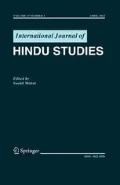Abstract
The All World Gayatri Pariwar is a modern Hindu movement that utilizes scientific rhetoric a great deal in its discourse. Based on ethnographic research undertaken at the main āśram of the movement in Haridwar, this article provides an overview of the Gayatri Pariwar before shifting to a more sustained discussion of the āśram’s middle-class residents. Noting that younger āśram residents narrate their decisions to move to Shantikunj rather differently than senior residents, I identify an upwardly mobile but disillusioned middle class as a significant subset of the community and situate their experience of being middle class in the larger academic discourse. I conclude with some brief thoughts about the special role that the movement’s scientific rhetoric plays in appealing to this predominately STEM-educated group.
Similar content being viewed by others
References
Alter, Joseph S. 2000. Gandhi’s Body: Sex, Diet, and the Politics of Nationalism. Philadelphia: University of Pennsylvania Press.
Babb, Lawrence A. 1986. Redemptive Encounters: Three Modern Styles in the Hindu Tradition. Berkeley: University of California Press.
Berlant, Lauren. 2011. Cruel Optimism. Durham: Duke University Press.
Brahmavarchas, ed. 2011. Thought Revolution: A Western Introduction to the Work of Acharya Shriram Sharma. Haridwar: Yugantar Chetna Publications.
Fernandes, Leela. 2006. India’s New Middle Class: Democratic Politics in an Era of Economic Reform. Minneapolis: University Of Minnesota Press.
Fuller, Jason D. 2009. “Modern Hinduism and the Middle Class: Beyond Reform and Revival in the Historiography of Colonial India.” The Journal of Hindu Studies 2, 2: 160–78.
Ganguly-Scrase, Ruchira and Timothy J. Scrase. 2008. Globalisation and the Middle Classes in India: The Social and Cultural Impact of Neoliberal Reforms. New York: Routledge.
Gold, Daniel. 2013. “Bābā Jai Gurudev in the Qasbā: The Ruralization of a Modern Religion.” International Journal of Hindu Studies 17, 2: 127–52.
Hatcher, Brian A. 2008. Bourgeois Hinduism, or the Faith of the Modern Vedantists: Rare Discourses from Early Colonial Bengal. New York. Oxford University Press.
Jeffrey, Craig. 2010. Timepass: Youth, Class, and the Politics of Waiting in India. Stanford: Stanford University Press.
Joshi, Sanjay. 2001. Fractured Modernity: Making of a Middle Class in Colonial North India. New York: Oxford University Press.
Latour, Bruno. 1993 [1991]. We Have Never Been Modern (trans. Catherine Porter). Cambridge: Harvard University Press.
Liechty, Mark. 2012. “Middle Class Déjà Vu: Conditions of Possibility, from Victorian England to Contemporary Kathmandu.” In Rachel Heiman, Carla, Freeman, and Mark Liechty, eds., The Global Middle Classes: Theorizing Through Ethnography, 271–99. Santa Fe: School for Advanced Research Press.
Llewellyn, J. E. 1993. Arya Samaj as a Fundamentalist Movement: A Study in Comparative Fundamentalism. New Delhi: Manohar.
Lukose, Ritty A. 2009. Liberalization’s Children: Gender, Youth, and Consumer Citizenship in Globalizing India. Durham: Duke University Press.
Lutgendorf, Philip. 1997. “Monkey in the Middle: The Status of Hanuman in Popular Hinduism.” Religion 27, 4: 311–32.
Pandya, Pranav. 2009. The Pioneers of Scientific Spirituality (trans. Rajani Joshi, Abhitabh Saraf, Lakshmi Kasturi, Madhuri Nadig, and Rajiv Nadig; trans. ed. Shambhudass and R. P. Khare). Haridwar: Shri Vedmata Gayatri Trust.
Pandya, Pranav and Jyotirmay. 2001. Cetnā kī Śikhar Yātrā. Volume 1. Haridwar: Shri Vedmata Gayatri Trust.
Pandya, Pranav and Jyotirmay. 2009 [2001]. Odyssey of the Enlightened (trans. R. P. Khare and Madhuri Nadig; trans. ed. Shambhudass). Volume 1. Haridwar: Shri Vedmata Gayatri Trust.
Prakash, Gyan. 1999. Another Reason: Science and the Imagination of Modern India. Princeton: Princeton University Press.
Saler, Michael. 2006. “Modernity and Enchantment: A Historiographic Review.” The American Historical Review 111, 3: 692–716.
Sharma, Shriram. 2010a. Gāyatrī Mahāvijñān. Mathura: Yug Nirman Yojana Vistar Trust.
Sharma, Shriram. 2010b. Super Science of Gayatri (trans. Satya Narayan Pandya and Shambhudas). Mathura: Yug Nirman Yojana Vistar Trust.
Sharma, Shriram. 2010c. Sunsān ke Sahacar. Mathura: Yug Nirman Yojana Vistar Trust.
Sharma, Shriram. 2011a. Hamārī Vasīyat aur Virāsat. Mathura: Yug Nirman Yojana Vistar Trust.
Sharma, Shriram. 2011b. My Life: Its Legacy and Message (trans. Satya Narayan Pandya; trans. rev. Shambhudass). Mathura: Yug Nirman Yojana Vistar Trust.
Sharma, Shriram. 2011c. Companions in Solitude (trans. V. A. Shivashankaran). Haridwar: Shri Vedmata Gayatri Trust.
Srivastava, Sanjay. 2012. “National Identity, Bedrooms, and Kitchens: Gated Communities and New Narratives of Space in India.” In Rachel Heiman, Carla, Freeman, and Mark Liechty, eds., The Global Middle Classes: Theorizing Through Ethnography, 57–84. Santa Fe: School for Advanced Research Press.
Waghorne, Joanne Punzo. 2001. “The Gentrification of the Goddess.” International Journal of Hindu Studies 5, 3: 227–67.
Yogananda, Paramahansa. 1946. Autobiography of a Yogi. New York: The Philosophical Library.
Author information
Authors and Affiliations
Corresponding author
Additional information
Publisher's Note
Springer Nature remains neutral with regard to jurisdictional claims in published maps and institutional affiliations.
Rights and permissions
About this article
Cite this article
Heifetz, D. Religion, Science, and the Middle Class in the All World Gayatri Pariwar. Hindu Studies 23, 27–42 (2019). https://doi.org/10.1007/s11407-019-09249-0
Published:
Issue Date:
DOI: https://doi.org/10.1007/s11407-019-09249-0



